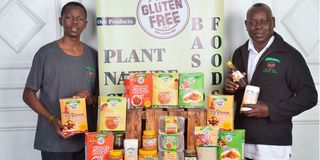Premium
Harnessing climate-smart crops for a healthier future

Andrew Egala and his son Ray Mugala with their products offerings.
Forgotten traditional and underutilised agri-foods possess significant nutritional, medicinal, and social-economic potential. When properly promoted and supported, these foods can play a crucial role in poverty reduction, increase farmers’ incomes, jobs and venture creations along value chains, also enhance food security and nutrition across Africa.
Green Without Borders targets to provide gluten-free, organic products sourced from climate-resilient value chains. Founded by Andrew Egala, Mugala Naturals, a brand under Green Without Borders, aims to tackle pressing global health challenges.
“Mugala Naturals was founded during the peak of the Covid-19 pandemic, when it became evident that weakened immune systems and poor nutrition were contributing to widespread illness and deaths, alongside viral infections,” he says.
During this time, Mr Egala realised food's immense potential as a tool for disease prevention and immune strengthening. His belief that, "food is thy medicine" became a guiding principle for the company.
The continent's rich agricultural heritage is often overlooked in Africa, with numerous nutrient-dense crops dismissed as "poor man’s food." This untapped potential, alongside the growing global concerns about malnutrition, anaemia and non-communicable diseases (NCDs) provided the catalyst for Mugala Naturals.
Mugala Naturals seeks to transform these underutilised crops into health-enhancing, value-added products through innovation and a deep respect for Africa's agricultural wealth.
His educational journey, culminating in a Master of Science in Entrepreneurship with a focus on SME Development from Jomo Kenyatta University of Agriculture and Technology (JKUAT), has greatly shaped his approach to running his business.
Food safety
“My academic background in the dynamic changing aspects of small and medium-sized enterprises (SMEs) enabled me to apply practical business strategies and theories to the food industry,” he says.
He has extensive experience in Agri-business consultancy and innovation management across the continent, with training in complementary foods, food safety, nutrition, and global food loss and waste management, equipping him with the skills to ensure the brand meets industry standards.
Mugala Naturals was conceived with a mission to address the global health crisis of malnutrition, a problem affecting a majority of the global population.
The company aims to combat these issues by producing nutrient-rich foods that help mitigate malnutrition, undernutrition, and diet-related NCDs.

Mugala Naturals product portfolio includes breakfast cereals, honey, peanut butter, pre-cooked porridge, healthy snacks, and cookies.
Starting Mugala Naturals was not without its challenges. Mr Egala says that he faced significant hurdles in the procurement of raw materials, ensuring their quality, and navigating the complexities of logistics.
He acknowledges the challenges of finding reliable suppliers, dealing with high, packaging, licensing, certification and standardisation costs, and coping with the burden of taxes along production-processing and supply ecosystem were substantial.
Despite these hurdles, they have leveraged their agri-business consultancy arm to fund crucial activities such as trainings, research, prototyping, product development, and certifications.
“Since we have not yet officially launched, the company has majorly financed through internal resources, with a total investment of over Sh20 million. These funds have been used for various activities, including research, product development, marketing, equipment procurement, and brand promotion,” he says, adding that this careful financial planning has allowed the company to build a solid foundation before launching its products into the market.
The pandemic played a crucial role in shaping the vision of Mugala Naturals, highlighting the critical link between food, immunity, and disease prevention.
Mr Egala recognised that the global pandemic exacerbated existing health issues, particularly the prevalence of diet-related diseases, and saw an opportunity to provide healthier food options that promote immune health and overall well-being.
Climate-smart crops
Mugala Naturals’ choice of raw products—climate-smart crops—sets it apart from traditional food companies. These crops, including cassava, orange-fleshed sweet potato, millet, and sorghum, are rich in nutrients and also have lower environmental footprints.
“These crops are adaptable to climate change, making them ideal for sustainable agriculture in Africa. By adding value to them in our products, we are contributing to the fight against malnutrition, poverty, hunger, and climate change, while also ensuring food security and nutrition,” he says.
They work closely with champion aggregators and local farmers to ensure a consistent supply of high-quality crops for sourcing and processing.
To address challenges such as fluctuating prices, quality and quantity inconsistencies, and occasional delays, they partner with trusted producers across key value chains.
Ensuring that raw materials are sustainably sourced and processed, they have developed an integrated mobile application—Agroecology Digital Connect—leveraging Internet of Things (IoT) data management.
“This system enhances credibility, effectiveness, and efficiency by providing real-time tracking and monitoring, ensuring transparency throughout the sourcing and processing stages," says Mr Egala.
Raw products are processed at primary facilities in Migori and Busia counties, supporting local livelihoods in the sourcing communities. Secondary processing and packaging takes place in Machakos County.
Minimal processing techniques, such as washing, grating, drying, and milling, are used to preserve natural nutrients. Depending on the product, additional methods like stemming or freezing may also be applied.
The crops are then mixed with other ingredients, followed by baking or extrusion, before being packaged and labelled. The products are then stored and marketed to consumers.
“We ensure that eco-friendly practices are employed throughout the supply chain, including biodegradable packaging and regenerative agricultural methods that improve soil health,” he says.
Through partnerships with organisations like the Kenya Bureau of Standards (Kebs), Technoserve, and the Global Alliance for Improved Nutrition (GAIN), he says that Mugala Naturals ensures that its products meet rigorous safety and quality standards.
The company is also committed to reducing its carbon footprint by implementing sustainable practices in sourcing, production, and packaging.
Breakfast cereals
A small, efficient team of four is maintained, with most services outsourced to ensure optimal effectiveness. Mugala Naturals product portfolio includes breakfast cereals, honey, peanut butter, pre-cooked porridge, healthy snacks, and cookies.
As health consciousness rises globally, Mugala Naturals is tapping into a growing market for organic, gluten-free, and sustainable food products. Consumers are increasingly seeking out foods that align with their values of health, sustainability, and ethical sourcing.
He says that they are well-positioned to meet this demand, offering a diverse range of products that cater to different dietary needs, from healthy snacks to breakfast cereals and instant porridge.
“We have showcased our products at various agricultural and business investment forums across the country, as well as internationally in South Sudan, Uganda, Tanzania, and Burundi.”
Mugala Naturals is committed to empowering local farmers and agricultural communities. By sourcing raw materials locally, the company helps to support local economies and improve the livelihoods of smallholder farmers.
“We have partnered with organisations like the Kenya Agricultural and Livestock Research Organisation (Karlo), ensuring farmers are trained in sustainable farming practices, access to high-quality planting materials, and relevant support they need, Kenya Climate Innovation Centre (KCIC), for -technical assistance, finance and market linkages, Kenya Brand and promotion Agency (Keproba)” he says.
Mugala Naturals is focused on long-term sustainability, aiming to reduce food waste, promote eco-friendly packaging, and contribute to biodiversity conservation.
“We plan to scale our operations and expand our reach within the African market and beyond, leveraging on e-commerce and partnerships with distributors to ensure its products are accessible to a broader consumer base,” he concludes.





